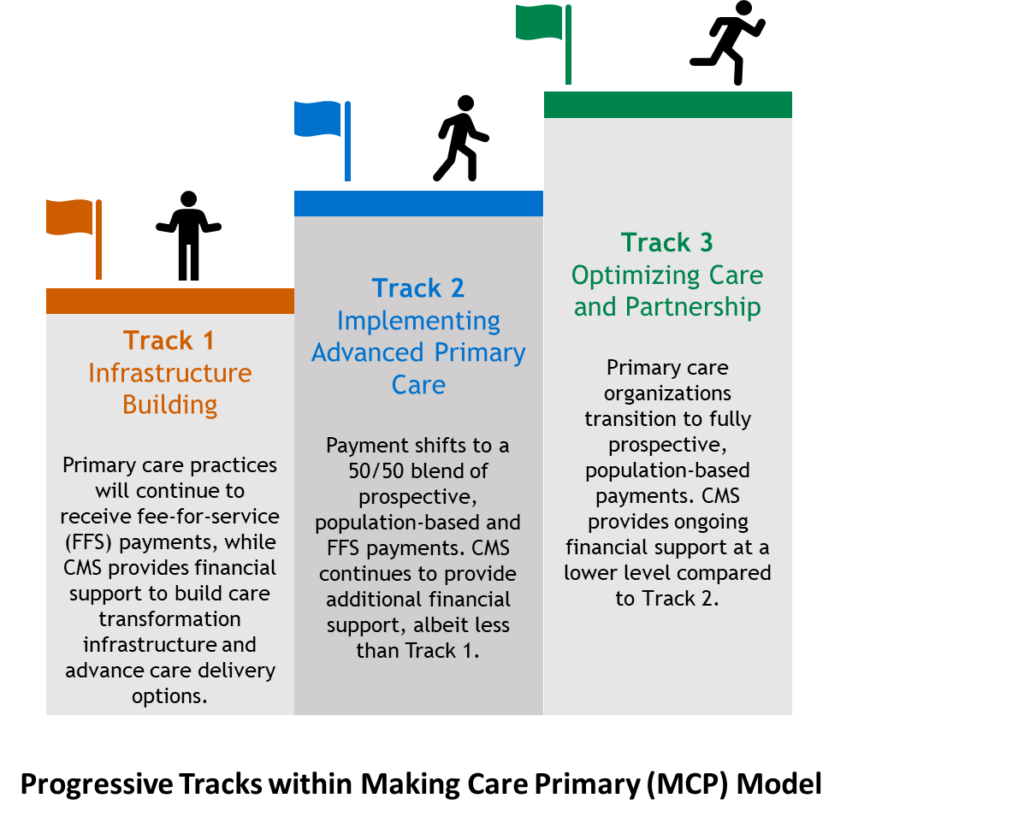
Empowering Advanced Primary Care Providers in the Journey to Value

The Centers for Medicare and Medicaid Services (CMS) recently announced a new primary care-focused initiative called the Making Care Primary (MCP) Model. This new model aims to strengthen the primary care infrastructure and address community priorities, including chronic condition management, behavioral health services, and increased access for underserved beneficiaries.
Understanding the Making Care Primary (MCP) Model
The Making Care Primary (MCP) Model is a multi-state primary care initiative designed to enhance access and quality of care while addressing key community priorities. Building on previous care models, like the Comprehensive Primary Care (CPC) model and the health equity components of Accountable Care Organization Realizing Equity, Access, and Community Health (ACO REACH), the MCP Model introduces an innovative payment structure to financially support the role of primary care while improving patient outcomes and ensuring equitable healthcare delivery. Care delivery in this model encompasses three domains:
- Care Management: building support and services for care management and chronic condition self-management.
- Care Integration: strengthening connections with specialists while using behavioral health screening and evaluation to improve patient care and coordination.
- Community Connection: addressing health-related social needs (HRSNs) and connecting patients to community resources and services.
Eligibility: To participate, primary care practices like Federally Qualified Health Centers (FQHCs) must be a Medicare enrolled entity that bills health services for at least 125 beneficiaries. Additionally, at least 51% of its primary care sites must be in one of the participating states.
Participating States: The MCP Model will initially launch in eight states: Colorado, Massachusetts, Minnesota, New Jersey, New Mexico, New York, North Carolina, and Washington. Specific eligibility criteria and integration with each state’s Medicaid program will be announced later, emphasizing the model’s commitment to state-specific implementation.
Overlap with ACOs: Practices already participating in the Medicare Shared Savings Program (MSSP) and ACO REACH are not eligible to participate.
Model Start & Duration: The MCP Model is scheduled to launch on July 1, 2024, and will run for ten and a half years. The application process for interested primary care practices within participating states opens in late summer 2023, allowing ample time for preparation and participation.
Model Overview: There are three progressive tracks within the MCP Model, each focusing on different aspects of care transformation and payment arrangements:
- Track 1 – Infrastructure Building: In this initial phase, primary care practices will continue to receive fee-for-service (FFS) payments, while CMS provides financial support to build care transformation infrastructure and advance care delivery options.
- Track 2 – Implementing Advanced Primary Care: Payment shifts to a 50/50 blend of prospective, population-based and FFS payments. CMS continues to provide additional financial support, albeit less than Track 1.
- Track 3 – Optimizing Care and Partnership: Primary care organizations transition to fully prospective, population-based payments. CMS provides ongoing financial support at a lower level compared to Track 2.

Empowering Advanced Primary Care Providers with Value-based Care Enablement Services
Having been at the forefront of value-based care enablement for the past ten years, CHESS Health Solutions has seen firsthand the barriers that small independent, rural providers face when transitioning to value-based care. Access to high-quality primary care is essential to furthering health equity, and CHESS is optimistic that the MCP Model will carve the way for value-based care delivery in underserved communities. Organizations interested in participating in this new primary care initiative should consider the following critical success factors:
- Provider Empowerment & Engagement: Empowered and engaged providers dramatically impact health outcomes. Effective communication and collaboration among healthcare providers streamline workflows and improve clinical and financial performance.
- Clinical Enablement Support: To manage chronic conditions, enhance patient engagement, and provide personalized care plans. Care teams need tools to form partnerships and leverage community-based connections. These teams also need insights into medical expenses and proven strategies to close care gaps and provide comprehensive, coordinated care to patients with complex needs.
- Pharmacy Management: Comprehensive pharmacy management services include medication reconciliation, adherence monitoring, and medication therapy management. Optimizing medication regiments can significantly improve patient outcomes and reduce medication-related complications.
- Care Delivery & Transformation: Providers cannot sustain patients’ health and health-related social needs alone. They need support in the form of wrap-around services, including behavioral health integrations, chronic care management, transitional care management, and advanced care planning.
- Population Health Data & Analytics: Coordinated, holistic care requires advanced analytics tools and technology to drive actionable insights at the point-of-care. These insights allow the entire care team to actively engage patients, identify at-risk populations, track performance metrics, manage coding and care gaps, and implement targeted interventions for improved health outcomes.
CHESS applauds the CMS Innovation Center for recognizing the tremendous need to support and provide increased financial payments to primary care providers through population-based payments. For decades, primary care providers have acted as the quarterback of the healthcare system without matching payments for that effort. CHESS looks forward to partnering with the Innovation Center to provide the financial and clinical support needed to restore this crucial role in healthcare.
About the Authors

Melissa Pollock, M.Div., CHC
Director, ACO Compliance and Regulatory Affairs


